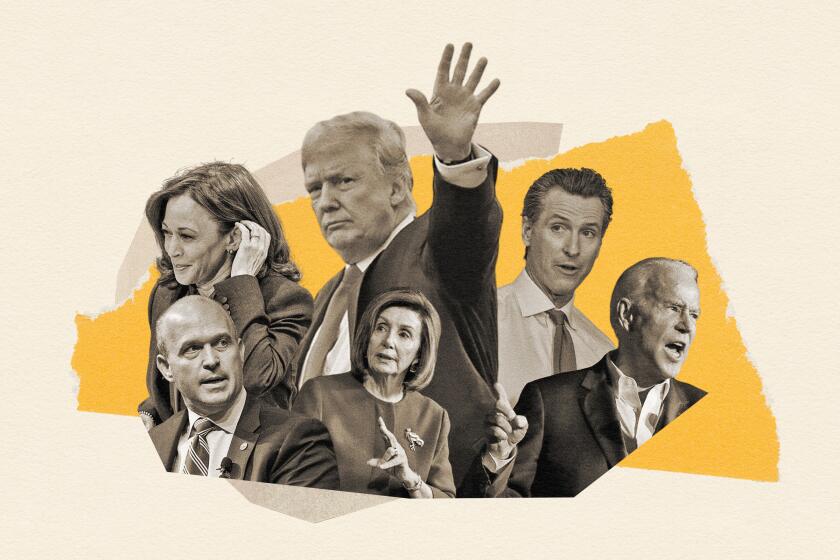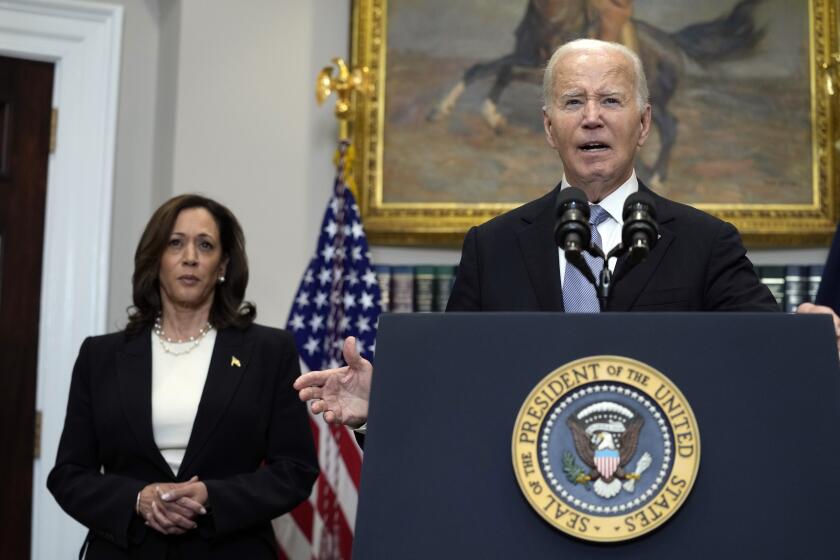
- Share via
When Jennifer Mercieca published a book four years ago titled “Demagogue for President: The Rhetorical Genius of Donald Trump,” some of her friends immediately questioned the title. “‘Genius’?” they asked. “Really?”
Mercieca stood by it. She told her friends that, over her many years studying the former president, Trump’s ability to use words and images to promote himself and his agenda stood out again and again as exceptional.
That same skill set was the first thing that came to mind for Mercieca on Saturday, she said, when she watched Trump rise from a bloodied rally stage after being shot, pump his fist in the air and utter an instant political slogan: “Fight! Fight! Fight!”
“To me, that was a perfectly Trumpian moment,” Mercieca said. “He knows what the scene is. He’s a demagogue of the spectacle. He’s an authoritarian P.T. Barnum.”
In the days since the shooting, elected officials, pundits and other political observers have been focused intensely on political rhetoric and its power to incite violence.
He’s an authoritarian P.T. Barnum
— Jennifer Mercieca, author, on Donald Trump
President Biden said it’s time to “cool it down.” Trump said he’s writing a new message of unity into his planned speech for the Republican National Convention on Thursday. “UNITE AMERICA!” he posted to Truth Social, a social media platform largely built on the divisiveness of Trump’s past political barbs.
Under such a spotlight, and in the wake of what some consider an iconic political moment in modern American history, how are voters and political observers the world over to listen to Trump moving forward? If he calls for unity, should they take him seriously?
It doesn’t matter which conservative playbook you consult. A second Trump term would mean federal war on California ideas.
Neither Trump’s campaign nor the Republican National Committee, which is working closely with the campaign, responded to a request for comment on Trump’s plans.
But Mercieca and other experts who’ve studied Trump, his image and the way he speaks to his base said they are skeptical that Trump will somehow change his tune now. They said they’ll be listening closely for a message of unity Thursday, but don’t expect it to be his only message — or for it to stick around very long.
“When I reflect back on the nine years that he’s been in public [political] life, he’s been very consistent about how he communicates, and it’s always been a message of projecting strength, of using rhetorical strategies that belittle the opposition,” said Mercieca, a political historian and communications professor at Texas A&M.
“He loves the idea of people uniting if that means uniting behind Trump,” she said. “But as soon as any criticism is lodged at him, he will revert back to his normal, aggressive rhetoric.”
Several experts predicted that Trump will indeed use the attempt on his life to call for unity, but in the short term. In the long term, they say, he is more likely to use it to bolster more divisive political narratives he has long relied on, including the idea that ordinary Americans are under imminent threat from an array of foreign and domestic forces, and that he is the only one who can protect them.
Robert C. Rowland, a professor of rhetoric at the University of Kansas and author of the book “The Rhetoric of Donald Trump: Nationalist Populism and American Democracy,” said he would be shocked if Trump took up any real notion of unity — like “how Democrats love America, too.”
Instead, Rowland predicted Trump will quickly fall back on “the themes he always falls back on — the nationalist theme, the populist theme that the elites don’t care about you and look down on you, and then the theme that he’s the strongman protector of people.”
Republicans are mentioning ‘Ka-MAL-a’ a lot. But Trump shooting lowers pressure on Biden to drop out
The assassination attempt on Trump, as well as his pick of a running mate, have taken attention away from Biden’s decline and lowered pressure on him to step aside.
Many on the conservative right have reinforced their claim — especially since Saturday’s shooting — that Trump is a religious figure, a man sent by God to defend America and restore Christian values to government.
That idea also could become part of Trump’s message, namely if others around him urge him to incorporate it into his speech Thursday or his stump speech on the campaign trail, Rowland said. But “that kind of rhetoric does not come naturally” to Trump, he said — citing the time that Trump as president walked across Lafayette Park in Washington amid street protests and awkwardly held a Bible outside a local church.
More likely, Rowland said, is that Trump will use the assassination attempt to ratchet up the sort of us-against-them rhetoric.
“Part of his appeal is that he’s the straight talker who will be the defender of these groups who feel put upon by the elites,” Rowland said. After Saturday’s shooting, “the harshness of his rhetoric and what he is going to do to protect them has to leverage up — it can’t become more moderate.”
Ian Haney López, a Berkeley law professor, is the author of two books on political rhetoric in the modern era, including “Dog Whistle Politics: How Coded Racial Appeals Have Reinvented Racism and Wrecked the Middle Class.”
The language that Trump is using is designed to promote and answer a single question: Who threatens you?
— Ian Haney López, law professor
Haney López said American voters listening to Trump in the coming days and months will almost certainly hear the same sort of fear- and race-based messaging that he said have defined Trump’s political career from the start.
“The language that Trump is using is designed to promote and answer a single question: Who threatens you?” Haney López said.
“He’s telling a story of constant and immediate threat that is coming from other people around you — and it can be immigrants, it can be African Americans, Black Lives Matter, it can be transgender people, it can be people insisting on gender equality,” Haney López said.
“He’s saying look at your neighbors, look around you, look at the people near you, but whatever you do, don’t look up. Don’t look up at the billionaire class, don’t look at large shareholders, don’t look at Wall Street, don’t look at the petrochemical industry.”
Haney López said the assassination attempt on Trump will bolster the idea already adopted wholly by Trump and his campaign that white America is “locked into racial conflict,” and that “others” — such as immigrants — “need to be restrained or caged or expelled” to ensure white Americans come out on top.
Mercieca agreed.
“He’s constantly telling his audience that they are the real Americans, they are the good Americans, they are the only ones who count, they have been left behind and humiliated, but he sees them as the good people they are and he will fight for them,” she said. “It’s a politics that is fascist, frankly. It is authoritarian.”
These tactics can be effective politically, she said, but they have consequences. Such rhetoric, she and others warned, spurs the kind of political violence that people on all sides of the political spectrum are denouncing.
Mercieca said data show Trump’s attacks on groups of people have spurred “stochastic terrorism” — or political violence against groups of people targeted with hostile political rhetoric.
Brian Levin, founder of the Center for the Study of Hate and Extremism and professor emeritus at Cal State San Bernardino, said such data are everywhere — and undeniable.
J.D. Vance, the Ohio senator and author of the acclaimed memoir ‘Hillbilly Elegy,’ will be the Republican vice presidential nominee, former President Trump announces.
Hate crimes against Black people, Levin said, rose when Trump used harsh language to condemn Black Lives Matter protesters in 2020. They rose against Asian people when Trump used anti-Chinese rhetoric in speaking about COVID-19. They rose against Latinos when Trump stoked fears about “caravans” of migrants arriving on the southern border.
Levin said “hate rhetoric” is always high during election years, and that everyone — voters, candidates and Trump especially — would be wise to “tone it down.”
Levin said Trump’s next move — and his Thursday speech — matter, but how he and others continue to discuss the stakes of the race from now until November will matter more.
“People are much more likely to embrace bigoted stereotypes when there is a narrative behind it that is repeated and repeated in a way that is entertaining and comforting,” Levin warned. “And you can hear it in the lilt of Trump’s voice.”
More to Read
Get the L.A. Times Politics newsletter
Deeply reported insights into legislation, politics and policy from Sacramento, Washington and beyond. In your inbox twice per week.
You may occasionally receive promotional content from the Los Angeles Times.













